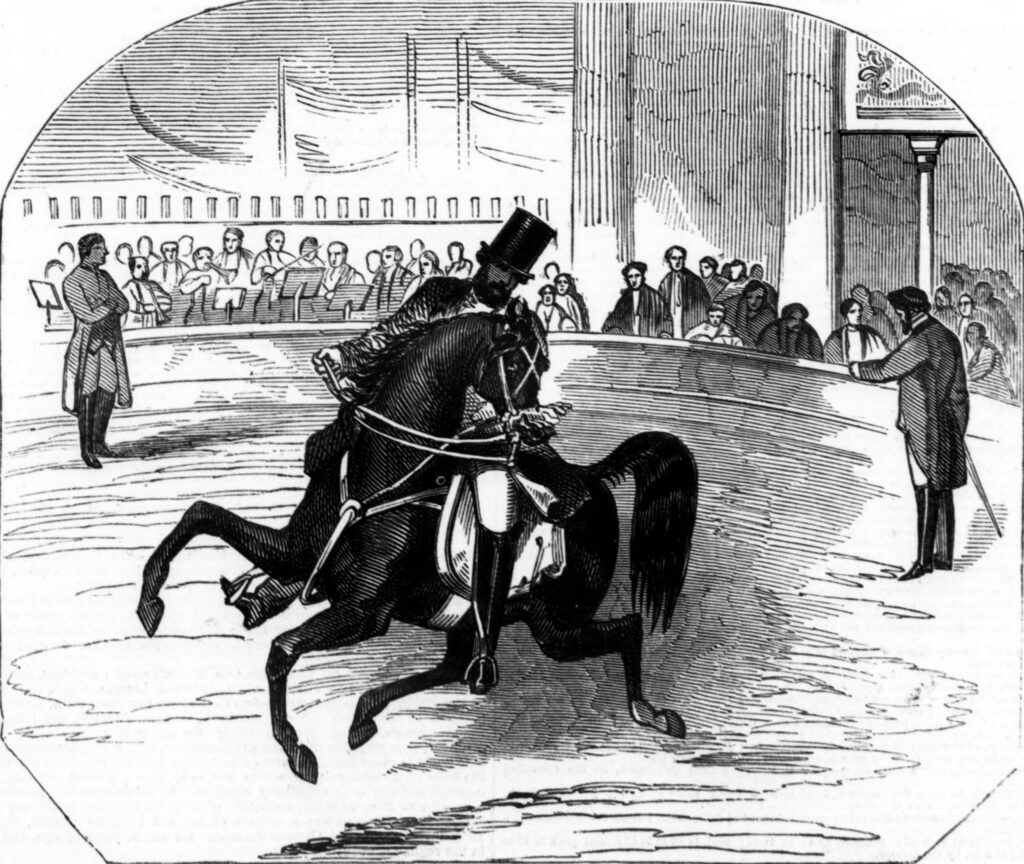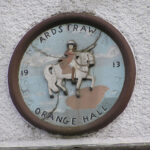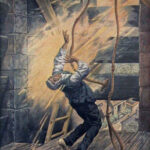20 March 1848: Showman Pablo Fanque tells an inquest how he overfilled a poorly propped Leeds circus, which collapsed, killing his wife

Pablo Fanque’s black mare dancing to the band (and not vice versa) at Astley’s Circus a year before the tragedy (Illustrated London News 1847/03/20).
Leeds Mercury. 1848/03/25. Shocking accident at Mr. Pablo Fanque’s circus. Leeds. Get it:
.Unedited excerpt
If an excerpt is used in the book, it will be shorter, edited and, where applicable, translated.
A serious and fatal accident occurred at the Circus – a temporary wooden erection – occupied by Mr. W. Darby, better known by the name of Pablo Fanque, and his corps of equestrians, in King Charles’s-croft, Leeds, about a quarter to ten o’clock en Saturday night last. The performances were for the benefit of Mr. Wallett, the celebrated comic jester or clown, and the circus was crowded in every port, many persons having had to be refused admission owing to the want of room. All went well, till the hour above-named, at which time Pablo Fanque, junior, was performing some feats on the tight rope, when suddenly that portion called the pit, which was a kind of wooden chamber, built in a sloping position upon a framework of wood, fell to the ground with a tremendous crash. There were upwards of six hundred persons, of all ages and both sexes, in the pit at the time, and the most of these fell with the broken and loosened timber and planks of which it was composed; some of them fell into the gallery which adjoined the front of the pit, but was on a lower level; and many fell into the lobby of the building, and others out at one side, the weight of the falling timber and the people together bursting out a portion of that side Of the circus the nearest to Land’s-lane. Mrs. Darby and Mrs. Wallett were both in the lobby at the time of the melancholy occurrence. They were both thrown down, and we regret to say, that two heavy planks fell upon the back part of the head and neck of Mrs. Darby and killed her on the spot. Mrs. Wallett received some severe bruises and contusions, but she is fast recovering. Many other persons were injured, but none, we believe, seriously. The gas with which the circus was lighted was put out by some of the pipes being broken in the fall, and and the scene presented immediately after the erection had given way, was one of indescribable alarm and confusion.
On Monday morning, Mr. J. Blackburn, the borough coroner, held an inquest, at the house of Mr. John Kitson, King Charles’s Hotel, King Charles’s-croft, on the body of Susannah Darby, aged forty-eight years, who was killed by the falling of a portion of the circus occupied by her husband, on Saturday night last. The first witness examined was,-
Mr. William Darby (usually known by the name of Pablo Fanque). He said, – I am proprietor of the equestrian establishment now occupying the circus in this croft. The deceased was cash taker in the lobby. I was present when the accident occurred, which I think was about a quarter to ten o’clock on Saturday night last. The house was very full, but I thought we had had more money in that was in that night; there certainly was more money than taken for the gallery, and consequently more persons in the gallery than there had ever been before. The performance was for the benefit of Mr. Wallett. There would be six hundred persons in the pit, which, as well as the gallery, was quite full, and many persons were turned away for want of room. I had no reason to suppose the building was insecure. One side of the building rather sloped downwards, but that I supposed was in the construction. I had never seen or heard tell of any symptoms of the building or any part of it giving way. I believed all was safe, or I would not have done what I did and placed my good lady there. The moment before the accident, I had put my boy on the tight rope, and had turned my eye off the audience upon my boy, when the whole party in the pit came down. I heard the crash, turned round, and they appeared to have come down bodily. I ran into the stable, got into the street and to the end where my wife was. I broke the window, cutting my hand in doing so, and I pulled out Mrs. Wallett, who I though was my wife; for I was not aware that there was any person in the lobby but my wife. Mrs. Wallett was a good deal cut. I found Mrs. Pablo laid on her face, with two planks laid upon the back of her head. They were eleven inch planks, and had formed a seat. I believe they had dislocated the vertebrae at the base of her neck. The persons on the seats had come down with them, but they had got off the planks when I got there. The whole of the persons, or nearly so, who were on the seats, must have fallen down.
The CORONER:-It is a most providential thing that the accident was not worse than it was.
I lifted the planks up, and got my wife out. I got her out in from seven to eight minutes, or ten at the furthest, after the fall. I got her to this inn. I believe she was dead when I first got her out. Her head hung down on her shoulder, and I never observed her breathe at all. I sent for Mr. Hey, surgeon, but she was dead. The check-taker had just taken some checks out of Mrs. Pablo’s hand, and he escaped unhurt, having run underneath the side boxes, a part of which did not fall. I think a part of the tight rope was connected with the lower part of the pit, but the upper part fell. When I took the circus, I heard that it was safe; it was examined by my architect, Mr. Arnold, but he is not here. I have had circuses for many years, and never had a plank or seat to fail; but this circus was not built upon the principle I have mine built upon. The only way in which I can account for this accident is, that the stringers of the gallery gave way, and let the other fall. If any thing in the front gave way, the whole of the other part would fall. It was not in separate portions. Just before the accident, one of my children was with Mrs. Pablo, but the child had been sent for some eggs, and escaped injury. We had also had two apprentices there just before; and a girl was there, and had just removed, and was hit over the back part of her head.
By a JURYMAN – I do not think that the pressure of the backs of the people in the gallery would make the planks come from together.
Mr. Joseph Woodhead, joiner and builder, was of opinion that if the gallery and the pit had been sufficiently propped, the accident would not have occurred.
Mr. William Britton, joiner, deposed – I built the circus in question. I cannot say what number of persons the gallery and the pit were built to hold. It was built in November last for Mr. Charles Hengler. He employed his own surveyor, and I built under his directions. The plan was his. I think the accident has arisen from the place being over crowded – more being upon the timber than it could bear. I am of opinion that the gallery gave way first. There have been props only at the ends. I think there was some in the centre at the time the circus was built, but they have been taken away by Hengler’s men, when they got their things out. I cannot speak positively that there were props in the centre, but I would not have intentionally left it without props in the centre. Hengler used the part underneath the gallery for a storing place, and they may have taken them away in order to get their things out. My intention was to take the place down soon after they left, had not Mr. Pablo taken it. The upper part of the pit was propped, but the props cannot be found this morning. There was a prop at every bearer, but we cannot find them. I can say positively that there was a prop at every bearer. I cannot say for what purpose they have been removed. I let the place to Mr. Pablo, and he has been in it fourteen days. I let the place to Mr. Pablo, and he has been in it fourteen days. I let him the place as it stood, and he was to make any alteration he liked at his own expense. He sent his own architect to examine it, and he was there for a week, and he had two of my men to do any little job that was requisite.
Thomas Hebden, Esq., the proprietor of King Charles’s Croft, and a magistrate of the borough, said that he had his attention drawn to the circus when it was building, and when the roof was blown off. He cautioned Mr. Britton and all parties concerned to be careful. He intended to get the town surveyor to look at it, but Mr. James and Mr. Child (police officers), who were accustomed to examine buildings, went over it, and said that there was no occasion for any further examination. Apparently, too, there was more wood in the building than in the former ones.
The CORONER then briefly recapitulated the chief points of the evidence, and said that it appeared to him that there had been nothing like culpable negligence, but that the whole was the result of accident arising, in all probability, from some error of judgment.
The jury immediately returned a verdict of “Accidental death.”
The remains of Mrs. Darby were interred at the Cemetery, Woodhouse, on Wednesday afternoon. The funeral cortege was of a very imposing character. The hearse was drawn by four cream-coloured horses. After the hearse followed the favourite horse of the deceased, led by a groom. Then came the mourning coaches, and after them the whole of Pablo Fanque’s stud of horses, bearing emblems of mourning, each led by a groom. The event appeared to excite great interest, and an immense concourse of people, amounting to at least 10,000, attended to witness the funeral.
Comment
Comment
William Wallett describes the incident in his memoirs, adding:
My wife and Mrs. Pablo were seated together in the pay office beneath the falling mass. Mrs. Wallett happened to be sitting upright, and was knocked down by the timbers. She received some injury, but was not dangerously hurt. But poor Mrs. Pablo, who was looking over the front of the money-taking place, was struck by a falling beam, and killed on the spot. In the confusion that followed, some vile thief stole her watch from her side, and her box containing upwards of £50, the takings of the evening (Wallett 1870).
Wallett, a friend and partner of Fanque, left to join Ryan’s circus, which immediately went bust, and then Astley’s (Frost 1875).
Whence “Fanque”? Did its pronunciation evoke Widow Twankey – by then a well-established character? My impression is that Darby/Fanque’s skin pigment is never mentioned in the 1840s (see e.g. the article accompanying the lead illustration), only in passing by the 1870s, and obsessively nowadays.
Re “Mrs Pablo” in various accounts, here’s George Melly writing about his childhood in 1930s Liverpool:
The door was eventually opened by Davis, curiously described as ‘the head waitress’, who had been at Chatham Street since 1914. Dressed in a severe black uniform with white cap and apron she nevertheless gave an impression of White-Queen-like dishevelment and calm panic. Like Gangie’s Marjorie, she identified members of the family by trusting the surname as taken for granted. She addressed my parents as Mr and Mrs Tom, Gangie and Gampa were Mr and Mrs Heywood, her employers Mr Willy and Miss Eva. Davis had a rapid, very slight Liverpool accent. I never knew her Christian name or, at the time, imagined that she even had one (Melly ).
Unfortunately, Pablo Fanque’s show for the benefit of another employee, Mr Kite, took place in Rochdale (Lancashire):
Will some kind person please start a Wikipedia entry for the Hengler family, who had considerable influence in the circus world.
Something to say? Get in touch
Similar
 23 January 1643: Thomas Fairfax, the Rider of the White Horse, captures Leeds from the Beast with the help of Psalm 68
23 January 1643: Thomas Fairfax, the Rider of the White Horse, captures Leeds from the Beast with the help of Psalm 68 12 December 1641: John Sugden causes panic in Bradford and Pudsey with news of the imminent advent of genocidal Irish Catholics
12 December 1641: John Sugden causes panic in Bradford and Pudsey with news of the imminent advent of genocidal Irish Catholics
Comment
Comment
Something to say? Get in touch
Search
Donate
Music & books
Place-People-Play: Childcare (and the Kazookestra) on the Headingley/Weetwood borders next to Meanwood Park.
Music from and about Yorkshire by Leeds's Singing Organ-Grinder.



 Bluesky
Bluesky Extwitter
Extwitter